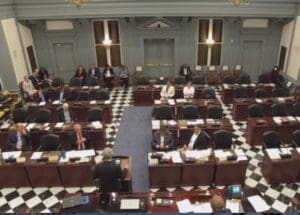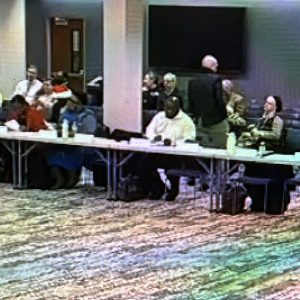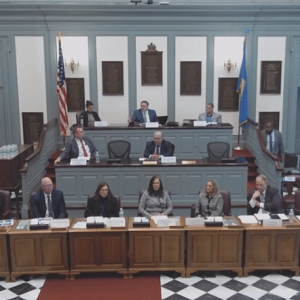
DNREC Secretary Shawn Garvin, standing, tells the House Natural Resources & Energy committee that a bill requiring in-person hearings wasn’t needed.
A bill that would force DNREC to hold public meetings in person and allot at least two hours for public comment on major issues got quite a lot of comment during a hearing Wednesday before being approved.
House Bill 434, sponsored by Rich Collins, R-Millsboro, the bill will keep the Delaware Natural Resources and Environmental Control Department “transparent and citizen friendly” by returning to pre-COVID practices of having in-person public hearings and meetings.
Collins told the House Natural Resources & Energy Committee that he had amended his bill to say that the public meetings did not need to be for every issue. They could be limited issues of statewide importance, such as electric vehicles or offshore wind, and could be designated by the secretary rather than applying to every issue.
They also would require DNREC to allow people to sign up and speak when they arrived at a hearing, rather than taking online reservations in advance and preventing those attending from being able to speak, too.
Collins said one of the big issues with DNREC hearings is that many were online and that internet access is limited in much of Sussex County, which meant public comment and opinions were limited, too, in online hearings and forums.
HB 434 would require DNREC to have a physical location allowing the public to attend and testify in person. The hearings may allow virtual participation in addition to in-person participation, the bill says.
However, all public hearings must allow for at least 2 hours of testimony and in no event limit testimony to less than 1 minute per person, the bill said.
The fiscal note associated with the bill said that having in-person hearings would cost DNREC about $200,000 a year. That would cover $142,611 in overtime for four DNREC staff members and two Natural Resource Police officers and $57,965 for fleet vehicles, court reporter expenses, facility rental and on-site technology support.
Collins admitted he really didn’t like Zoom meetings and always preferred in-person meetings.
“I want people to have the opportunity to go to meetings in person,” he said.
He and other Republicans have been loudly opposed to the way that DNREC operated meetings about new rules for electric vehicles, saying it prevented a number of people from being able to express themselves.
Ire at DNREC
Collins said one reason he amended the bill to allow the DNREC secretary to decide which meetings needed to be public was because it would cost the department a lot of money to do it for every issue.
The department holds lots of smaller hearings and briefings on this such as the catch limit of fish, he noted. Only a few dozen of people show up for those and those meetings are limited enough in scope that they don’t need a big venue or even in-person meetings, he said.
DNREC Secretary Shawn Garvin testified that his department had been working with Collins on the bill, but that he didn’t think the in-person ruling was needed.
He noted he hadn’t seen the amendment until that morning, and he found it confusing.
“What is the purpose of the public hearing,” Garvin asked rhetorically. “Public hearing are to collect comments. It’s not a give and take. It’s not a situation where you ask questions back and forth.”
The public information sessions are held where and when the department things they are warranted, he said.
“That is in person and we have relevant staff there to address questions and concerns that residents have,” he said. “Comments that are given in a public hearing are treated the same way as if you put something on our website or if you’ve mailed a letter into us. There’s no discerning difference between somebody giving a verbal comment.”
IN THE NEWS: Here’s where and when to see fireworks for the Fourth
DNREC has a comment period whenever it’s adopting new rules or changing the rules, he said.
Garvin said DNREC started having virtual meetings during COVID, and was the first group to figure out how to do it.
The department considered virtual meetings another tool at its disposal, he said.
Hybrid meetings are difficult, he said, because technology may not work at the locations chosen for in-person meetings.
But, he said, a time for comments and the ability for the department to continue taking comments after a meeting is over is baked into department policy.
The bill passed with four yes votes and four on its merits, which means the voter thought the issue should go to the full House floor.
It only has Thursday and Sunday to pass both the House and Senate. If it doesn’t, it will have to be reintroduced next year when the General Assembly reconvenes.
RELATED STORIES:

Betsy Price is a Wilmington freelance writer who has 40 years of experience, including 15 at The News Journal in Delaware.
Share this Post












